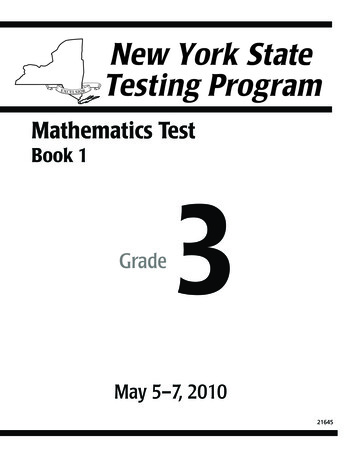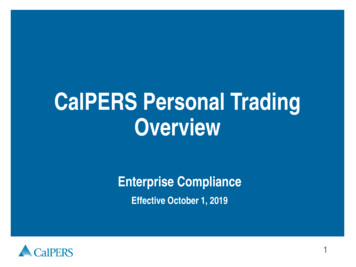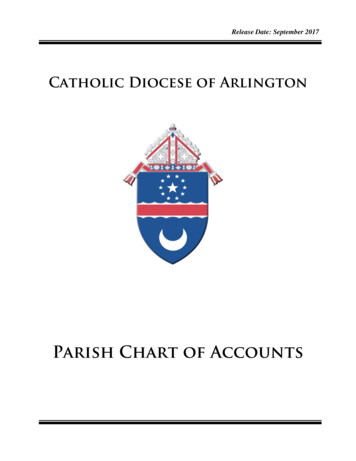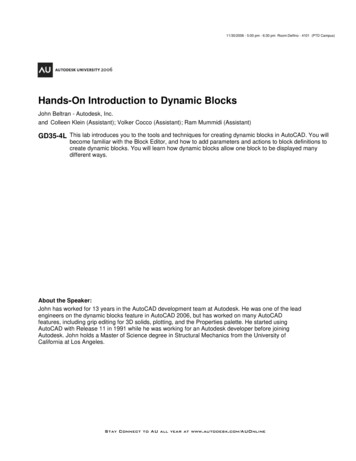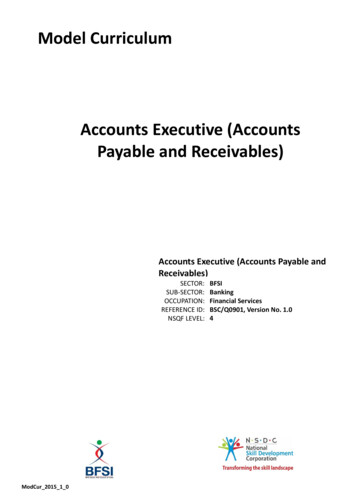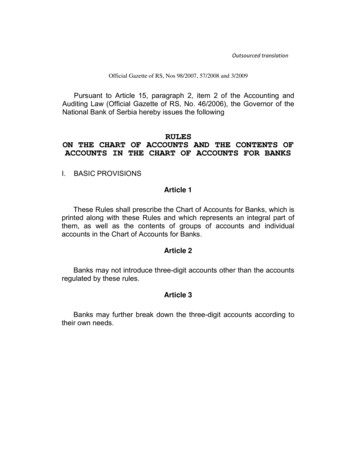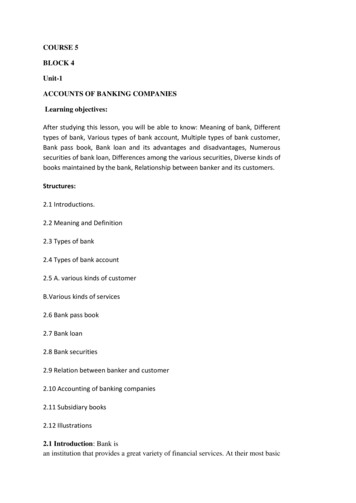
Transcription
COURSE 5BLOCK 4Unit-1ACCOUNTS OF BANKING COMPANIESLearning objectives:After studying this lesson, you will be able to know: Meaning of bank, Differenttypes of bank, Various types of bank account, Multiple types of bank customer,Bank pass book, Bank loan and its advantages and disadvantages, Numeroussecurities of bank loan, Differences among the various securities, Diverse kinds ofbooks maintained by the bank, Relationship between banker and its customers.Structures:2.1 Introductions.2.2 Meaning and Definition2.3 Types of bank2.4 Types of bank account2.5 A. various kinds of customerB.Various kinds of services2.6 Bank pass book2.7 Bank loan2.8 Bank securities2.9 Relation between banker and customer2.10 Accounting of banking companies2.11 Subsidiary books2.12 Illustrations2.1 Introduction: Bank isan institution that provides a great variety of financial services. At their most basic
, banks hold money on behalf ofcustomers, which is payable to the customer on demand, either by appearing at the bank for a withdrawal or bywriting a check to a third party.2.2Meaning and definitions of bank:A bank is a commercial institution, licensed to accept deposits and acts as a safecustodian of the spendable funds of its customers. Banks are concerned mainlywith the functions of banking, i.e., receiving, collecting, transferring, buying,lending, investing, dealing, exchanging and servicing (safe deposit, custodianship,agency , trusteeship) money and claims to money both domestically andinternationally. The principal activities of a bank are operating current accounts,receiving deposits, taking in and paying out notes and coins, and making loans2.3Different types of Bank:There are various types of banks and they can be divided into some of thefollowing categories:Savings banks: These banks function with the intention to culminatesaving habits among people, especially those who belong to low incomegroups or those who are salaried. The money these people deposit in thebanks are invested in securities, bonds etc. These days, many commercialbanks perform the dual functions of savings bank. The postal departmentis also in a way a saving bank.Commercial banks: These banks function to help the entrepreneurs andbusinesses. They give financial services to these businessmen like debitcards, banks accounts, short term deposits, etc. with the money peopledeposit in such banks. They also lend money to businessmen in the formof overdrafts, credit cards, secured loans, unsecured loans and mortgageloans to businessmen.The commercial banks can be further classifies as: public sector bank,private sector banks, foreign banks and regional banks.1. The public sector banks are owned and operated by thegovernment, who has a major share in them. The major focus ofthese banks is to serve the people rather earn profits. Someexamples of these banks include State Bank of India, PunjabNational Bank, Bank of Maharashtra, etc.
2. The private sector banks are owned and operated by privateinstitutes. They are free to operate and are controlled by marketforces. A greater share is held by private players and not thegovernment. For example, Axis Bank, Kotak Mahindra Bank etc.3. The foreign banks are those that are based in a foreign country buthave several branches in India. Some examples of these banksinclude; HSBC, Standard Chartered Bank etc.4. The regional rural banks were brought into operation with theobjective of providing credit to the rural and agricultural regionsand were brought into effect in 1975 by RRB Act. These banks arerestricted to operate only in the areas specified by government ofIndia. These banks are owned by State Government and a sponsorbank.5. Cooperative banks: These banks are controlled, owned, managed andoperated by cooperative societies and came into existence under theCooperative Societies Act in 1912. these banks are located in the urban aswell in the rural areas. Although these banks have the same functions asthe commercial banks, they provide finance to farmers, salaried people,small scale industries, etc. and their rates of interest of interest are lower.6. Investment banks: These are financial institutions that provide financialand advisory assistance to their customers. Their clients can beindividuals, businesses, or government organizations. They assist theircustomers to raise funds when required. These banks act as theunderwriters for their customers when they want to raise capital by issuingsecurities. In some cases, they also help their customers to issue securities.Specialized banks: These provide unique services to their customers.Some such banks include foreign exchange banks, development banks,industrial banks, export import banks etc. These banks also provide hugefinancial support to businesses and various kinds projects and traders whohave to import or export their goods or services.Central bank: The central bank is also called the banker's bank in anycountry. In India, the Reserve Bank of India is the central bank. TheFederal Reserve in USA and the Bank of England in UK function as thecentral bank. This bank makes various monetary policies, decides the ratesof interest, controlling the other banks in the country, manages the foreignexchange rate and the gold reserves and also issues paper currency in acountry.2.4Various types of bank account:Bank Accounts are classified into four different types. They are,
1) Current Account:2) Savings Account:3) Recurring Deposit Account:4) Fixed Deposit Account:Current Account: Current account is mainly for business persons, firms,companies, public enterprises etc and is never used for the purpose of investmentor savings.These deposits are the most liquid deposits and there are no limits fornumber of transactions or the amount of transactions in a day. While, there is nointerest paid on amount held in the account, banks charge certain service charges,on such accounts. The current accounts do not have any fixed maturity as theseare on continuous basis accounts.Savings Account: Savings Account is meant for saving purposes. Any individualeither single or jointly can open a savings account. Most of the salaried persons,pensioners and students use Savings Account. The advantage of having SavingsAccount is Banks pay interest for the savings. The saving account holder isallowed to withdraw money from the account as and when required.The rate of interest ranges between 4% to 6% per annum in India. There is norestriction on the number and amount of deposits. But withdrawals are subjectedto certain restrictions. Some banks recommend to maintain a minimum amount tokeep it functioning.Recurring Deposit Account: Recurring deposit account or RD account is openedby those who want to save certain amount of money regularly for a certain periodof time and earn a higher interest rate. In RD account a fixed amount isdeposited every month for a specified period and the total amount is repaid withinterest at the end of the particular fixed period.Fixed Deposit Account:In Fixed Deposit Account (also known as FD Account), aparticular sum of money is deposited in a bank for specific period of time. Its onetime deposit and one time take away (withdraw) account. The money deposited inthis account cannot be withdrawn before the expiry of period. However, in case ofneed, the depositor can ask for closing the fixed deposit prematurely by paying apenalty. The penalty amount varies with banks. A high interest rate is paid onfixed deposits. The rate of interest paid for fixed deposit varies according toamount, period and also from bank to bank.2.5 A.Types of Bank deposit customersBanks open accounts for various types of customers like individuals, partnershipfirm, Trusts, companies, etc. While opening the accounts, the banker has to keepin mind the various legal aspects involved in opening and conducting thoseaccounts, as also the practices followed in conducting those accounts. Normally,the banks have to deal with following types of deposit customers.1.2.3.4.5.6.IndividualsJoint Hindu FamiliesPartnership FirmsLimited Liability CompaniesClubs and AssociationsTrusts
1. Individuals:The depositor should be properly introduced to the bank and KYC norms are to beobserved. Introduction is necessary in terms of banking practice and also for thepurpose of protection under section 131 of the Negotiable Instruments Act.Usually, banks accept introductions from the existing customers, employee of thebank, a locally well-known person or another bank.A joint account may be opened by two or more personsNon-resident individuals (NRIs)Non-Resident Indian means, a person, being a citizen of India or a person ofIndian origin residing outside India. A person is considered Indian Origin when heor his parents or any of his grand parents were Indian National.: Various Types of NRI Accounts: Ordinary Non-resident Rupee Accounts (NRO Accounts);Non-Resident (External) Rupee Accounts (NRE Accounts);Non-resident (Non-Repatriable) Rupee Deposits (NRNR Accounts); andForeign Currency (Non-Resident) Accounts (Banks) Scheme (FCNR (B)Accounts).While NRO and NRE accounts can be kept in the form of current, savings bank,recurring deposit or term deposit accounts, deposits under NRNR and FCNR (B)schemes can be kept only in the form of term deposits for periods ranging fromsix months to three years.2. Joint Hindu Family (JHF):Joint Hindu Family (JHF) (also known as Hindu Undivided family) is a legalentity and is unique for Hindus. It has perpetual succession like companies; but itdoes not require any registration. The head of JHF is the Karta and members ofthe family are called co-parceners. The JHF business is managed by Karta.3. Partnership firms:A partnership is not a legal entity independent of partners. It is an association ofpersons. Registration of a partnership is not compulsory under Partnership Act.However, many banks insist on registration of a partnership. In any case, iestamped partnership deed or Partnership letter should be taken when an account isopened for a partnership. The partnership deed will contain names of the partners,objective of the partnership, and other operational details, which should be takennote of by the bank in its dealings.4. Joint stock companies:A company is registered under companies Act has a legal status independent ofthat of the share-holders. A company is an artificial person who has perpetualexistence with limited liability and common seal. Memorandum and Articles ofAssociation, Certificate of Incorporation, Resolution passed by the Board to openaccount, name and designations of persons who will operate the account withdetails of restriction placed on them are the essentials documents required to openan account.
5. Clubs, Societies and Associations:The clubs, societies, association etc., may be unregistered or registered. Accountmay be opened only if persons of high standing and reliability are in the managingcommittee or governing body. Copy of certificate of registration and Copy of byelaw, certified to be the latest, by the Secretary/President are required to beobtained and also a certified copy of the resolution of the ManagingCommittee/Governing body to open the bank account and giving details of officebearers etc., to operate the account.6. Trust Account:Trusts are created by the settler by executing a Trust Deed. A trust account can beopened only after obtaining and scrutinizing the trust deed. The Trust account hasto be operated by all the trustees jointly unless provided otherwise in the trustdeed. A trustee cannot delegate the powers to other Trustees except as providedfor in the Trust Deed. A cheque favoring the Trust shall not be credited to thepersonal account of the Trustee.2.5 B. various kinds of services:Banks offer many different channels to access their banking and other services: Automated teller machinesA branch in a retail locationCall centreMail: most banks accept cheque deposits via mail and use mail tocommunicate to their customers, e.g. by sending out statementsMobile banking is a method of using one's mobile phone to conductbanking transactionsOnline banking is a term used for performing multiple transactions,payments etc. over the InternetRelationship managers, mostly for private banking or business banking,often visiting customers at their homes or businessesTelephone banking is a service which allows its customers to conducttransactions over the telephone with automated attendant, or whenrequested, with telephone operatorVideo banking is a term used for performing banking transactions orprofessional banking consultations via a remote video and audioconnection. Video banking can be performed via purpose built bankingtransaction machines (similar to an Automated teller machine), or via avideo conference enabled bank branch clarificationDSA is a Direct Selling Agent, who works for the bank based on acontract. Its main job is to increase the customer base for the bank.2.6 Bank Pass Book:Passbook or Bank Statement is a copy of the account of the customer as it appearsin the bank’s books. When a customer deposits money and cheques into his bankaccount or withdraws money, he records these transactions in the bank column ofhis cashbook immediately.
Correspondingly, the bank records them in the customer’s account maintained inits books. Then they are copied in a passbook and given to the customer. With thecomputerization of banking operations, bank statements (in lieu of passbook) areissued to the customer’s periodically.Thus passbook is a record of the bankingtransactions of a customer with a bank. All entries made by a customer in hiscashbook (bank column) must be entered by the bank in the passbook.Format of a Bank Passbook or Bank Statement:Name of the bank Address of the bank AccountNo.Customer Name: Address of the awtelalslaNros2.7Bank loan:Bank loans are the easiest source of availing finance. A bank loan is an extensionof credit by a bank to a customer or business; it has to be paid along with interest.Features of Bank Loans:Bank loans have the following characteristics:1. It is a short-term source of finance.s
2. A bank loan may be either secured or unsecured depending upon thecircumstances.3. The interest charged by the bank on such a loan may be either fixed or variable.4. If mortgage loan is to be obtained, the borrower has to pay a number of feessuch as title searching fees, application fees, inspection fees, etc.Advantages of Bank Loans:A bank loan offers the following advantages:1. They can be easily procured.2. They can be used for short-term as well as medium-term financing.3. Interest paid on a bank loan is a tax deductible expenditure.Disadvantages of Bank Loans:The disadvantages of bank loans are:i. Some bank loans carry prepayment penalty.ii. Borrowing too much as a bank loan can lead to decreased cash flow.iii. In most cases, the bank does not disburse the whole amount of loan appliedfor, it pays cash lower than the loan demanded.2.8Securities for loan: Securityin banking terms and specifically in relation to abank loan refers to any asset on which a charge is created by a bank in its favour;where any default occurs, i.e., the borrower (loan taker) is not able to pay the loanamount back, and then this asset is the Bank’s refuge!The Bank will utilize thisasset on which it has a charge, in the manner(s) allowed by various laws, andrecover its dues. Thus Bank’s interests (the loan amount and interest on the loan)are secured by creation of a charge on some assets which belong to the borrower –henceknownasasecurity.If you want a loan from a bank (or any other financial institution), you generallyneed to provide some kind of security against the loan to the bank. There areseveral types of securities, against which a bank will offer you a loan Pledge: It is used when the bank (or, lender, known as pledge) takesactual possession of the securities, such as goods, certificates, gold, etc, which aregenerally movable in nature. Bank keeps the securities with it, and provide loan toyou.Bank willreturnthe securities (possession ofgoods)toyou (borrower, known as pledger), after you repay all the debts (i.e., loan) tothe bank. In case you are unable to pay back, then the bank has the right tosell the assets, and recover the loan amount (with interest).Example - Goldloans, Jewelry loans, advances against NSC (National Saving Certificates),or loans against any other assets.Hypothecation: It is used when you (borrower) have the actual possession ofthe asset, for which you have taken the loan. Generally, this is charged againstloans for movable assets, like car, bus, etc. (i.e., vehicle loans). Here,
the assets (bus, car, etc.) remain with you, and you are hypothecated tothe bank for the loan granted.In case you are unable to repay the loan amount,then the bank has the right to sell the asset (bus, car, etc.), (which is possessed byyou) and recover the total amount (with interest).Mortgage: It is used when you (borrower) have the actual possession ofthe assets, for which you are granted loan (e.g., house loan), or against which youare granted loan (e.g., house mortgaged). Mortgages are generally those assets,which are permanently attached with Earth surface, like house, land, factory etc.Incaseyouare unable to repay the loanamount,the bank hasthe right to seize and sell the mortgage,and recover the loanamount (withinterest).Lien: It is almost similar to Pledge, except that in case of lien, the lender can onlydetain the asset/goods until the borrower repays the loan, but have no rightto sell the asset,unless explicitly declared in the lien contract.Comparison between Pledge, Hypothecation and tionPledgedenotes thatthepersonwho takes theloanmustprovide thebankwithsomethingthat is worththesameamount as themoney he/shearetakingfrom the bankHypothecation isthe practice wheretheborrowerpledges collateralto acquire a loan.However,theborrower owns thepropertyorcollateral until hepays off the debtMortgage isnot a way oflending butratherthesecurityinterestinreal propertyheld by theborrowerCollateralYesYesYesOwnershipOwnership ofthe collateralis with thelenderOwnership is withthe borrowerOwnership iswiththeborrower
TypesGold LoansCar Loans2.9Banker-Customer Relationship:Banking is a trust-based relationship. There are numerous kinds of relationshipbetween the bank and the customer. The relationship between a banker and acustomer depends on the type of transaction. Thus the relationship is based oncontract, and on certain terms and conditions.These relationships confer certain rights and obligations both on the part of thebanker and on the customer. However, the personal relationship between the bankand its customers is the long lasting relationship. Some banks even say that theyhave generation-to-generation banking relationship with their customers.Thebanker customer relationship is fiducially relationship. The terms and conditionsgoverning the relationship is not be leaked by the banker to a third party.Classification of Relationship:The relationship between a bank and its customers can be broadly categorized into General Relationship and Special Relationship.If we look at Sec 5(b) of Banking Regulation Act, we would notice that bank’sbusiness hovers around accepting of deposits for the purposes of lending. Thus therelationship arising out of these two main activities is known as GeneralRelationship. In addition to these two activities banks also undertake otheractivities mentioned in Sec.6 of Banking Regulation Act. Relationship arising outof the activities mentioned in Sec.6 of the act is termed as special relationship.General Relationship:Debtor-Creditor: When a 'customer' opens an account with a bank, he fills in andsigns the account opening form. By signing the form he enters into anagreement/contract with the bank. When customer deposits money in his accountthe bank becomes a debtor of the customer and customer a creditor. The money sodeposited by customer becomes bank’s property and bank has a right to use themoney as it likes. The bank is not bound to inform the depositor the manner ofutilization of funds deposited by him. Bank does not give any security to thedepositor i.e. debtor. The bank has borrowed money and it is only when thedepositor demands, banker pays. Bank’s position is quite different from normaldebtors.Banker does not pay money on its own, as banker is not required to repay the debtvoluntarily. The demand is to be made at the branch where the account exists andReal EstateMortgageLoans
in a proper manner and during working days and working hours.The debtor has to follow the terms and conditions of bank said to have beenmentioned in the account opening form. Though the terms and conditions are notmentioned in the account opening form, but the account opening form contains adeclaration that the terms and conditions have been read and understood or hasbeen explained. In fact the terms and conditions are mentioned in the passbook,which is issued to the customer only after the account has been opened.2. Creditor–Debtor: Lending money is the most important activities of a bank.The resources mobilized by banks are utilized for lending operations. Customerwho borrows money from bank owns money to the bank. In the case of anyloan/advances account, the banker is the creditor and the customer is the debtor.The relationship in the first case when a person deposit money with the bankreverses when he borrows money from the bank. Borrower executes documentsand offer security to the bank before utilizing the credit facility.In addition to opening of a deposit/loan account banks provide variety of services,which makes the relationship more wide and complex. Depending upon the typeof services rendered and the nature of transaction, the banker acts as a bailee,trustee, principal, agent, lessor, custodian etc.Special Relationship:1. Bank as a Trustee:As per Sec. 3 of Indian Trust Act, 1882‘ A "trust" is an obligation annexed to the ownership of property, and arising outof a confidence reposed in and accepted by the owner, or declared and acceptedby him, for the benefit of another, or of another and the owner.’ Thus trustee is theholder of property on behalf of a beneficiary.As per Sec. 15 of the ‘Indian Trust Act, 1882 ‘A trustee is bound to deal with thetrust-property as carefully as a man of ordinary prudence would deal with suchproperty if it were his own; and, in the absence of a contract to the contrary, atrustee so dealing is not responsible for the loss, destruction or deterioration of thetrust-property.’ A trustee has the right to reimbursement of expenses (Sec.32 ofIndian Trust Act.).In case of trust banker customer relationship is a special contract. When a personentrusts valuable items with another person with an intention that such itemswould be returned on demand to the keeper the relationship becomes of a trusteeand trustier. Customers keep certain valuables or securities with the bank forsafekeeping or deposit certain money for a specific purpose (Escrow accounts) thebanker in such cases acts as a trustee. Banks charge fee for safekeeping valuables2. Bailee – Bailor:
Sec.148 of Indian Contract Act, 1872, defines "Bailment" "bailor" and "bailee".A"bailment" is the delivery of goods by one person to another for somepurpose, upon a contract that they shall, when the purpose is accomplished, bereturned or otherwise disposed of according to the directions of the persondelivering them. The person delivering the goods is called the "bailor". Theperson to whom they are delivered is called, the "bailee".Banks secure their advances by obtaining tangible securities. In some casesphysical possession of securities goods (Pledge), valuables, bonds etc., are taken.While taking physical possession of securities the bank becomes bailee and thecustomer bailor. Banks also keeps articles, valuables, securities etc., of itscustomers in Safe Custody and acts as a Bailee. As a bailee the bank is required totake care of the goods bailed.3. Lessor and Lessee:Sec.105 of ‘Transfer of property Act 1882’ defines lease, Lessor, lessee, premiumand rent. As per the section“A lease of immovable property is a transfer of a right to enjoy such property,made for a certain time, express or implied, or in perpetuity, in consideration of aprice paid or promised, or of money, a share of crops, service or any other thing ofvalue, to be rendered periodically or on specified occasions to the transferor bythe transferee, who accepts the transfer on such terms.”Definition of Lessor, lessee, premium and rent:(1) The transferor is called the lessor,(2)The transferee is called the lessee,(3)The price is called the premium, and(4)The money, share, service or other thing to be so rendered is called the rent.”Providing safe deposit lockers is as an ancillary service provided by banks tocustomers. While providing Safe Deposit Vault/locker facility to their customer’sbank enters into an agreement with the customer. The agreement is known as“Memorandum of letting” and attracts stamp duty.The relationship between the bank and the customer is that of lessor and lessee.Banks lease (hire lockers to their customers) their immovable property to thecustomer and give them the right to enjoy such property during the specifiedperiod i.e. during the office/ banking hours and charge rentals. Bank has the rightto break-open the locker in case the locker holder defaults in payment of rent.Banks do not assume any liability or responsibility in case of any damage to thecontents kept in the locker. Banks do not insure the contents kept in the lockers bycustomers.4. Agent and Principal:Sec.182 of ‘The Indian Contract Act, 1872’ defines “an agent” as a personemployed to do any act for another or to represent another in dealings with thirdpersons. The person for whom such act is done or who is so represented is called
“the Principal”.Thus an agent is a person, who acts for and on behalf of the principal and underthe latter’s express or implied authority and the acts done within such authorityare binding on his principal and, the principal is liable to the party for the acts ofthe agent.Banks collect cheques, bills, and makes payment to various authorities’ viz., rent,telephone bills, insurance premium etc., on behalf of customers. . Banks alsoabides by the standing instructions given by its customers. In all such cases bankacts as an agent of its customer, and charges for these services. As per Indiancontract Act agent is entitled to charges. No charges are levied in collection oflocal cheques through clearing house. Charges are levied in only when the chequeis returned in the clearinghouse.5. As a Custodian: A custodian is a person who acts as a caretaker of something.Banks take legal responsibility for a customer’s securities. While opening a demataccount bank becomes a custodian.6. As a Guarantor: Banks give guarantee on behalf of their customers and enterin to their shoes. Guarantee is a contingent contract. As per sec 31, of Indiancontract Act guarantee is a “contingent contract ". Contingent contract is acontract to do or not to do something, if some event, collateral to such contract,does or does not happen2.10Accounting of banking companies:.Banking activities undertaken by banks include personal banking (non-businesscustomers), commercial Banking (small and medium-sized business customers)and corporate banking (large international and multinational corporations).According to Charles J. Woelfel:A complete banking service would comprehend a variety of functions,including any of the following:(1)Receive demand deposits and pay customers' cheques drawn againstthem, and operate automated teller machines (ATM);(2)Receive time and savings deposits, issue negotiable orders ofwithdrawal, and pay interest thereon, as well as provide automatictransfer service (A TS) for funds from serving accounts to covercheques;(3)Discount notes, acceptances and bills of exchange;(4)Supply credit to business firms with or without security, issue letters ofcredit and accept bills drawn thereunder;(5)Transfer money at home and abroad;(6)Make collections and facilitate exchanges;(7)Issue drafts, cashier's cheques, money orders, and certify cheques;
(8)Furnish safe deposit vault service;(9)Provide custodianship for securities and other valuables;(10)Provide personal loans, credit and services to individuals, and lend ordiscount customer installment receivables of vendors;(11)Act in a fiduciary capacity for individuals, as well as establish commontrust funds;(12)Provide corporate trust services (stock transfer agent, registrar, payingagent, escrow agent, and indenture trustee);(13)Act as factors and engage in equipment leasing;(14)Deal in Government securities and underwrite general obligations ofstate and municipal securities;(15)Invest in government and other debt securities;(16)Act as fiscal agent or depository for the Central Government, states andsubdivisions of states;(17)Provide miscellaneous services such as place orders in securities forcustomers; act as insurance agent of incidental to banking transactions;serve as finder to bring buyers and sellers together; act as travel agentand issue letters of credit and traveler's cheques; provide club accountsand other special purpose accounts; act as agent for accepting service oflegal process of incidental I normal banking or fiduciary transactions ofthe bank; act as pay role issuer; establish charitable foundations, investin small business investment corporations and bank servicecorporations; deal in foreign exchange; buy and sell gold bullion underlicense from the Treasury Department, and foreign coin; providedomestic and international correspondent banking services, etc.2.11Subsidiary Books:These include the following:
Savings Account: Savings Account is meant for saving purposes. Any individual either single or jointly can open a savings account. Most of the salaried persons, pensioners and students use Savings Account. The advantage of having Savings Account is Banks pay interest for the savings. The saving account holder is
